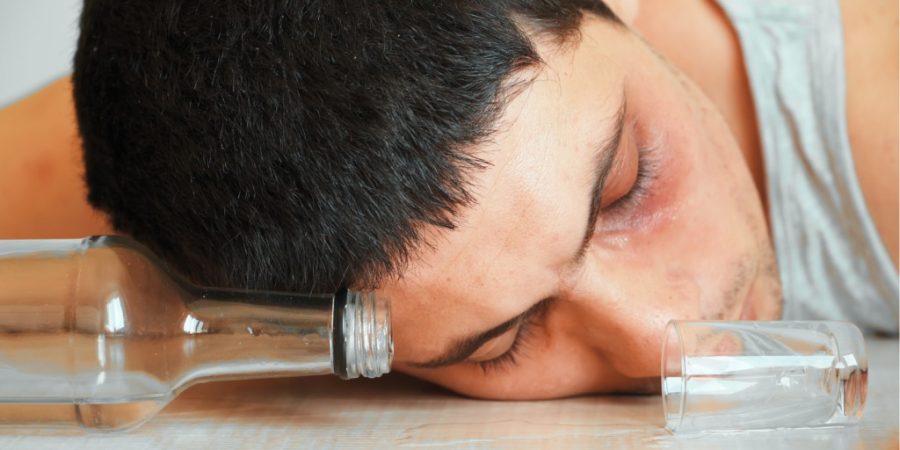
Alcohol is the most common intoxicant across the world, having a long history of usage in nearly every human culture. Subsequently, feeling sick after drinking is one of the most common ailments in human history, and most people have experienced the dreaded hangover feeling at some point. However, not all hangovers are created equal. Some effects of hangovers are well-known, such as headaches, dizziness, or feeling sick, but others are rare and sometimes worrying.
And this ambiguity raises a lot of questions. Can a hangover cause a fever? Throwing up after drinking is common, but when should it stop? Should you be feeling sick after drinking only small amounts of alcohol? To find out about the science behind hangover symptoms, read on.
Table of Contents
What Causes Hangovers?

Despite thousands of years of amateur and academic questioning, what exactly causes hangovers is still not completely understood. The most common explanation is that alcohol causes dehydration by acting as a diuretic, increasing the rate of urine production in the body. When people are drinking alcohol, they typically drink little or no water alongside it, which worsens the problem.
However, dehydration doesn’t account for all of the symptoms of a hangover. In fact, it’s possible to feel the effects of a hangover for hours or even days after all traces of alcohol have left your system. Additionally, studies that examine the connection between dehydration and the intensity of hangover symptoms have found little correlation between the two. The most common theory among scientists today is that hangovers are caused by a mixture of how the liver breaks down alcohol and alcohol’s effects on the immune system.
As the body processes alcohol, the first byproduct is a chemical known as acetaldehyde. This chemical is estimated to be around 10 to 30 times as toxic as alcohol itself. Moreover, acetaldehyde has been found to cause symptoms such as sweating, skin flushing, nausea and vomiting, and takes longer to remove from the body than alcohol.
Additionally, alcohol triggers the body’s natural immune system, in much the same way that an infection does—except that, instead of fighting disease, your immune system is fighting the alcohol you just consumed. Studies have shown that hangover symptoms are often accompanied by high levels of cytokines, proteins that the immune system uses to signal cells to fight a foreign infection. This can lead to headaches, nausea, exhaustion, and yes—even an alcohol fever.
Curing a Hangover and Fever
It’s important to note that, while it is possible that a hangover can cause a fever, it’s a very rare response. According to the National Institute on Alcohol Abuse and Alcoholism, the most common hangover symptoms include:
- Headache and muscle aches
- Exhaustion
- Nausea, vomiting, and stomach pain
- Difficulty sleeping and restless sleep
- Dizziness and sensitivity to lights or sounds
- Chills, sweating, and increased heart rate and blood pressure
Usually, minor hangovers will go away within a few hours, and severe ones typically disappear after 24 hours. However, when experiencing the debilitating effects of a hangover, waiting 24 hours for it to go away isn’t a very appealing idea. There are hundreds of supposed hangover cures, ranging from guzzling coffee for breakfast to going for a run. Ultimately, most of these solutions do little or nothing to help cure hangover symptoms.
So what can you actually do for a hangover? You can lessen some of the symptoms with over-the-counter drugs, such as stomach relief medicines for nausea or non-steroidal anti-inflammatories (NSAIDs) like aspirin or ibuprofen for headaches and other pains. You should avoid medicines that contain acetaminophen, such as Tylenol, as they can cause damage to the liver when paired with alcohol. Most important of all, you can get plenty of rest and water to give your body time to heal from the effects of alcohol.
One common tip for curing a hangover which you should definitely avoid is to drink more alcohol. It might temporarily dull your senses, making you less aware of the effects of the hangover, but it does nothing to resolve the underlying physiological problems. Furthermore, if you find yourself frequently experiencing severe hangovers, developing a fever after drinking, or feeling the desire to drink even when you’re already hungover, it could be a sign of something much more damaging than a simple hangover: alcohol withdrawal.
Do Hangovers and Fevers Go Together?

If you rarely drink, it’s unlikely that a minor fever during a hangover is caused by alcohol withdrawal. But if frequent, bad hangovers have become the norm for you, you don’t bounce back as quickly as you used to, or your hangover effects persist or even get worse over several days, then you may be experiencing the early effects of alcohol withdrawal.
Alcohol withdrawal syndrome (AWS) occurs when the body has become so used to the effects of alcohol that it alters the way the brain and other organs produce essential chemicals. When being under the influence of alcohol becomes the baseline for your body, you’ll begin to feel the symptoms of AWS when there’s not “enough” alcohol in your system.
Experiencing a fever after drinking is a common sign of alcohol withdrawal, typically showing up with other symptoms, such as tremors, anxiety, high blood pressure, and uncontrollable sweating. The most severe type of alcohol withdrawal is known as delirium tremens (DT), and can cause hallucinations, severe confusion, and even seizures.
Alcohol withdrawal can become a serious medical issue, and requires the attention of a medical professional. If you’re concerned about your alcohol usage, talk to a professional, especially if you’re a veteran. Veterans are at higher risk to develop addiction, and it can be especially hard for them to get treatment from people who understand what they’re going through. But there’s no harm in acting early in addressing potential problem drinking.
Getting Help for Alcohol Abuse
Alcohol withdrawal syndrome is a result of a larger issue known as alcohol use disorder (AUD), a physical and psychological dependence on alcohol. The best way to prevent AUD is to avoid regular heavy drinking. But if you’re already dependent on alcohol, then the best treatment is to seek professional counseling and medical care.
The good news is that, as a veteran, you have people in your corner who are ready to help. At Heroes’ Mile, we specialize in helping veterans with substance use disorders and mental health issues, which means we’re ready to help you fully recover from alcoholism.
Treatment begins with a medical alcohol detox, where you can safely deal with alcohol withdrawals under 24/7 medical supervision. Afterwards, most people transition to residential rehab, where you can begin to heal from the mental effects of addiction. We offer a variety of different methods of treatment, from group therapy to EMDR therapy to cognitive behavioral therapy.
Many of the staff members at our drug rehab centers in central Florida are veterans themselves, which makes them intimately aware of the challenges service members face. If you’re tired of hangovers, fevers, and alcohol withdrawal symptoms, then we’ve got your six. To inquire about any of our drug and alcohol programs or to enroll today, call 888-838-6692 or use our confidential online contact form.
The post Is It a Hangover? Fever, Nausea, and Pain After Alcohol appeared first on Heroes’ Mile Veterans Recovery Center.
Source
Original Author: Heroes’ Mile

